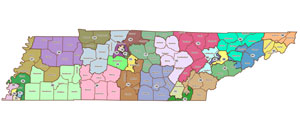Mike Knotts, Director of Government Affairs for the Tennessee Electric Cooperative Association
For years, I’ve heard the saying, “Patience is a virtue.” I’m not sure I’ve ever really thought about what that means. Have you? I just hear it, reflexively agree with it and move on to the next thing. Just another cliché, something that people say.
According to Wikipedia, “A virtue is a positive trait or quality subjectively deemed to be morally excellent and thus is valued as a foundation of principle and good moral being.” I know Wikipedia might not be the most authoritative source, but I think this entry passes the smell test. So, if I actually believe that definition, do I live in such a way that demonstrates patience? After all, actions speak louder than words — as we’ve always been told. Does our society really value patience?
In my opinion, it is undeniable that we are an instant-gratification nation. Fast food, ATMs, disposable diapers, digital cameras — all are incredible luxuries that have without doubt shortened our attention spans. I work in an industry that literally changed the world — but where patience is defined in milliseconds. Our margin for error is so slim. When you flip the switch, you expect the lights to come on. If the power stops flowing for just a second, all those digital clocks start blinking “12:00,” and the phone calls start pouring in to your co-op.
And these were only 20th century changes. The Internet has exponentially increased our ability to demand more and more information in less and less time.
For example, I am a voracious consumer of news. I have a need to stay connected to current events but see very little of it on television anymore. The 5 o’clock news has not been a part of my routine since I was in high school. I might read the newspaper to learn more detail of a major story, but almost never do I learn about it for the first time in the pages of my local daily. Most of my news comes to me now in near-real time through websites, email updates and social media like Twitter.
These advancements are not bad things; they are just changes. It’s hard to argue against the value of societal advancement. Take the automobile, for instance. Just because we’ve been trained to expect to cross the state in a matter of hours instead of days doesn’t mean we are impatient. We might be getting less patient in some of the ways we live our lives, but those changes by in large have enriched us and made us a more comfortable and prosperous people.
But what about those things that still require us to exercise patience? Parenthood has certainly put me to the test. I have three young sons, including 4-year-old twins, so there has been no shortage of opportunities to demonstrate my patience. Or, more appropriately, my lack thereof. I have to constantly remind myself that I can’t expect my boys to perfect a new task the first time, and I can’t expect them to grow without a lot of stumbles along the way.
When I arrive at the office, I again face the same struggles. It is my job to get involved in the details of how your elected representatives write the law. And the legislative process can sometimes be slow and arduous, it can sometimes be quick and haphazard, but it always requires careful diligence. However, it can be easy to sometimes jump to premature conclusions and not do the hard work that is necessary to make good decisions and accurate judgments.
Case in point: As a lobbyist, there are some lawmakers on whom you just come to rely. Experience has shown you time and time again that they are supportive of your organization and what it stands for, and when it comes time to cast a vote, they usually make the right decision. So what do you do when they suddenly reverse course and do something that could be incredibly harmful to the things you care about?
This happened to me recently. I could not believe the name when I read it at the top of the page. Someone I had come to rely upon suddenly appeared to be in opposition to the interests of electric cooperatives. Why? My first reaction was to take decisive action. Fire up the engines, and let’s head off to battle.
But wait a minute: Why would someone change their position when the circumstances surrounding that issue have not changed? Why would someone embrace a multimillion-dollar impact to our industry that would cause electric bills for almost all Tennesseans to unnecessarily rise? There had to be a reason. So I made a decision that flies in the face of our impatient, 24-hour news cycle culture. I decided to wait until I could actually talk to the person and determine what their motives might be.
So far, that decision has been a good one — both for my virtue and the interests of the member-owners of Tennessee’s electric cooperatives. There was a reason, and my first reaction would have made the situation much worse. So don’t forget: If patience truly is a virtue, then it just stands to reason that good things come to those who wait!





